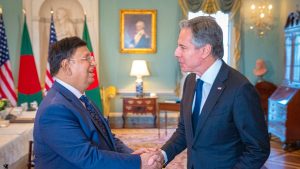General elections in Bangladesh, which are set to take place in January 2024, are quite significant. Despite being poor and underdeveloped, Bangladesh is growing fast and on a path to becoming a developing country by 2026.
In addition, Bangladesh has geostrategic significance. It serves as a connecting bridge between South Asia and East Asia, and between South Asia and the Middle East. It has drawn the attention of China and the United States. The outcomes of its upcoming elections will have political and economic ramifications beyond its borders, influencing the broader region.
There are concerns over corruption and violation of civil rights in Bangladesh. It is crucial to preserve the democratic process and make sure that the upcoming elections are free and fair and will restore political stability in the country.
The opposition has called for elections to be held under a caretaker government. However, this will be counterproductive in protecting democratic institutions in Bangladesh and might hinder the progress of the country, freeze international aid, and eventually hurt the Bangladeshi people.
The last caretaker government in Bangladesh (2006-2008) was backed by the military. It pushed the country further away from democracy. In a national effort to clean the political system, leading figures on both sides of the political divide were charged with corruption and graft.
Indeed, restoring a caretaker government in the current geostrategic environment would not necessarily benefit the opposition Bangladesh Nationalist Party, as the party might think.
As Albert Einstein said, “Insanity is doing the same thing over and over and expecting a different result.” There is no reason to believe that a caretaker government will dramatically change the entrenched habits of Bangladeshi politics for the better.
Instead, both the ruling Awami League and the opposition parties should find ways to preserve the democratic process and secure free and fair elections in the politically torn country. The U.S., which champions human rights and democracy, can be instrumental in helping Bangladesh to overcome this political crisis by remaining neutral. It should be invested in this not only because of the liberal spirit that guides it but also because of the larger geostrategic rationale of superpower competition and of the prospect of improved bilateral relations with Bangladesh which is set to become one of the largest economies in the world.
Relations between the U.S. and Bangladesh are suffering from mistrust and suspicion following Washington’s criticism of the Awami League government over its poor human rights record. Dhaka in turn has accused the U.S. of meddling in its internal affairs. In this context, Prime Minister Sheikh Hasina recently lashed out at the U.S. over what she sees as Washington’s double standards regarding democracy. “They are lecturing us on democracy and human rights,” she said. “What’s the situation in their country?” She accused the U.S. of trying to topple her government and of “trying to eliminate democracy.”
Hasina visited Washington D.C. at the end of April to celebrate 50 years of partnership with the World Bank. She also met with officials of the Bangladesh-U.S. business council. While the visit was important for business, it was a missed opportunity at the political level. Sending a clear message of dissatisfaction over Hasina’s remarks, none of Biden’s administration officials made the time to meet with the Bangladeshi prime minister.
Nonetheless, a few weeks earlier, Bangladesh’s Minister of Foreign Affairs A.K. Abdul Momen met U.S. Secretary of State Anthony Blinken in the U.S. capital. During that visit, Blinken had emphasized the need for free and fair elections rather than a caretaker government.
The two countries are marking a milestone of 50 years of diplomatic relations, and the potential to grow the relations further is still in reach despite recent disagreements.
The current tensions between the U.S. and Bangladesh are an opportunity for China to expand its influence in South Asia by offering generous investments and loans. China provides funding without making a fuss over Bangladesh’s democratic backsliding. It has already provided Bangladesh with several loans. Moreover, it is willing to work with all parties in Bangladesh if they serve its interests in the region.
For now, the scope of Chinese influence on Bangladesh remains very narrow. This is because Bangladesh has a diverse portfolio of international funding, and has received much aid from a range of countries including Japan, India and the U.S. Nevertheless, if not addressed on time, Bangladesh will turn to China for more investments and might find itself in a situation similar to that of Sri Lanka.
Looking ahead, the U.S. should adopt a pragmatic approach, taking steps to help Bangladesh protect its democratic institutions, but at the same time advance technological cooperation on climate, renewable energy and more, to assist Bangladesh in playing a bigger role in global supply chains, as a manufacturing center, including in the semiconductors sector, and to realize its potential as a global middle-power.
































